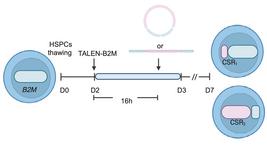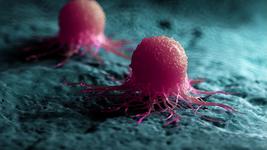CRISPR Screen Reveals TGFβ3 as Biomarker of Palbociclib Resistance in Triple Negative Breast Cancer
CMN Intelligence - The World’s Most Comprehensive Intelligence Platform for CRISPR-Genomic Medicine and Gene-Editing Clinical Development
Providing market intelligence, data infrastructure, analytics, and reporting services for the global gene-editing sector. Read more...
The cyclin-dependent kinases (CDK) are essential regulators of the cell cycle, and it is established that the activity of CDK4 and CDK6 are prerequisites for breast tumour formation.
In recent years, the approval of three CDK inhibitors, palbociclib, ribociclib, and abemaciclib, have revolutionised the treatment landscape for HER+ breast cancers. However, little is known about their efficacy in triple negative breast cancer (TNBC), which is among the most challenging cancers to treat. In addition, there is a scarity of reliable biomarkers for treatment response and resistance to this class of drugs.
In an article published yesterday in Molecular Cancer, scientists at McGill University Health Centre in Canada report transforming growth factor beta-3 (TGFβ3) as an actionable determinant of palbociclib sensitivity that potentiates its anti-tumour effects.
To identify genes that influence sensitivity to palbociclib, the team, led by Professor Jean-Jacques Lebrun, undertook an in vivo genome-wide loss-of-function CRISPR screen in mice that were injected subcutaneously with a human TNBC cell line that had been exposed to a CRISPR knockout library. The lentiviral pooled genome-scale CRISPR/Cas9 knockout GeCKOv2 library was used in this study; this covers the human genome with three single guide RNAs for each of the 19,050 target genes and 1,000 non-targeting control single guide RNAs.
More than 200 screen hits were compared to available microarray data from 38 breast cancer cell lines ranked based on their sensitivity or resistance levels to palbociclib, and pre-clinical xenograft models of TNBC were used to validate the top hits. Further experiments revealed that recombinant human TGFβ3 augmented the breast tumour response to palbociclib in vitro and in vivo in pre-clinical models of TNBC. The team suggest that the addition of TGFβ3 induces the expression of the CDK inhibitor p21, which further contributes to the inhibition of still-active CDK4/6/cyclin D1 and CDK2/cyclin E1 complexes. In agreement with this, they demonstrate that chronic palbociclib exposure depletes p21 levels, contributing to acquired resistance to palbociclib, and that TGFβ3 treatment can overcome this.
The study highlights TGFβ3 as a potentially new biomarker that may help to identify patients most likely to respond to palbociclib, and suggests the synergistic interaction between CDK4/6 and TGFβ3 as as potentially new combination treatment approach to TNBC.
Read the full article in Molecular Cancer here.
To get more CRISPR Medicine News delivered to your inbox, sign up to the free weekly CMN Newsletter here.
Tags
CLINICAL TRIALS
Sponsors:
Base Therapeutics (Shanghai) Co., Ltd.
Sponsors:
Base Therapeutics (Shanghai) Co., Ltd.







